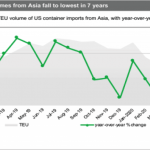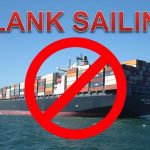6 Ways to Ensure You Choose the Right Freight Forwarding Incoterm
This is a guest post by Darren Hann.
International Commercial Terms (Incoterms®) play a significant role when you are importing or exporting goods in and out of all major cities. Irrespective of whether it’s the finished product, Work in Progress (WIP) inventory, or raw material that you are importing or exporting, Incoterms® are a set of rules which define the responsibilities of sellers and buyers for the delivery of goods under sales contracts.
They define the commercial parts, respective responsibilities, and risks of the importer and exporter involved in the transaction. As it is common that one or more freight forwarders take part in the movement of goods through the freight forwarding chain, an Incoterm also assists in deciding who will pay the freight forwarders for their part of work. Therefore, it is best to have crystal clear understanding of Incoterms® before you initiate any international freight forwarding movement.
Some companies mutually decide the Incoterms® without analyzing its impact and the associated risks and costs while others understand the complexity and importance of choosing the right Incoterm for their shipment. Expert freight forwarders have a deep understanding of all series of Incoterms® (2000 and 2010 plus the 2020 update) and who the responsibility lies with for the transaction. Consulting with experienced freight forwarding companies can assist your business to ensure a mutually beneficial Incoterm is selected for international sea freight and air freight services.
Read on to learn 6 ways to ensure you have chosen the right freight forwarding Incoterm.
1) Obtain a Correct and Competitive Price for Your Product
Cost of shipping can be completely or partly included in the price of a product. In order to have a clear comparison of prices and to know their competitiveness, it is important that you compare the price based on the same Incoterm from supply/demand points, as the inclusion or non-inclusion of shipping costs can have a huge impact on product prices. Having a clear understanding of the Incoterm being used and requesting a quote with the same Incoterm will assist you to make a comparable decision.
2) Gain Competitive Freight Costs
Smart businesses know that Incoterms® define where respective responsibilities start and end for the parties involved in the sea freight or air freight transaction. Without this clarity, a business may not be able to make an effective comparison of freight forwarding quotes. A clear understanding of Incoterms® assists you to negotiate well and gain a competitive sea freight or air freight quote from a freight forwarding company.
 3) Meet Your Freight Lead Times
3) Meet Your Freight Lead Times
On-time delivery is one of the main objectives of freight forwarding. Choosing the right Incoterm plays a vital role in meeting your freight timelines and maintaining control over your goods. By choosing the right freight forwarding Incoterm you are likely to gain the flexibility to choose a transportation mode such as sea freight or air freight and/or the mix of these modes while maintaining freight lead times and keeping costs low.
4) Maintain Control and Visibility
The Incoterm you select will determine where your chosen freight forwarding company gains custody of the goods for onward movement. This further ensures that you maintain control and visibility on the movement of your goods. Ultimately, the Incoterm you choose will determine how much control and visibility you have on your goods while they move through the freight forwarding chain.
5) Procure the Right Insurance for Your Cargo
The risks associated with the movement of goods internationally either fall on the buyer or the seller depending on the Incoterm you have selected. By choosing the right Incoterm, you get to choose the point at which the risk falls. The procurement of insurance cover and the associated cost for your part of risk depends on the chosen point you transfer the risk.
You may be shipping to/from a disturbed territory, which can be a risk as there is no assurance that the goods will move safely through it. The insurance costs for these kinds of territories are generally very high. By engaging a freight forwarder, you are likely to make the right decision from a risk perspective that can save you time and additional cost for insurance cover.
6) Consider the Mode of Transportation
When choosing your freight forwarding Incoterm, don’t forget your preferred mode of transportation in the process. While some Incoterms are suited for movement through certain modes of transportation such as sea freight and air freight others are interchangeable. In some cases, the choice is also driven by the width of services being provided by freight forwarding companies.
While your business may require a certain mode and Incoterm, the freight forwarding company may not be able to accommodate the request. Expert 3PLs understand this and involve their freight forwarding partner from the initial stages to avoid any confusion and/or disruptions while moving the goods as they are committed to avoiding delays in delivery and unnecessary costs on your behalf.
For any business requiring sea freight and air freight services, Incoterms make international trade transparent for the buyer and seller to understand their level of responsibility as well as avoid disruptions, misunderstanding and contractual ambiguity. Ideally, shippers are aware of all Incoterms available and do their due diligence to choose the best term for each transaction. Experienced international freight forwarders are likely to offer expert advice and assist you in choosing the best Incoterm for your requirements.

Related Links About Incoterms
Incoterms 2020 — What Is Changing from Incoterms 2010
All Incoterms Made Fast & Simple in New Video Series
What’s the Deal With Incoterms?!
Incoterms Definitions Part 1: EXW, FCA, FAS, FOB
Incoterms Definitions Part 2: CFR, CIF, CPT, CIP
Incoterms Definitions Part 3: DAT, DAP, DDP
This was a guest post by Darren Hann.
Author Bio
Darren Hann is a Commercial Manager at BCR Australia, one of Australia’s largest freight forwarding and third party logistics companies. BCR services all major cities in Australia, including Brisbane, Sydney and Melbourne.




